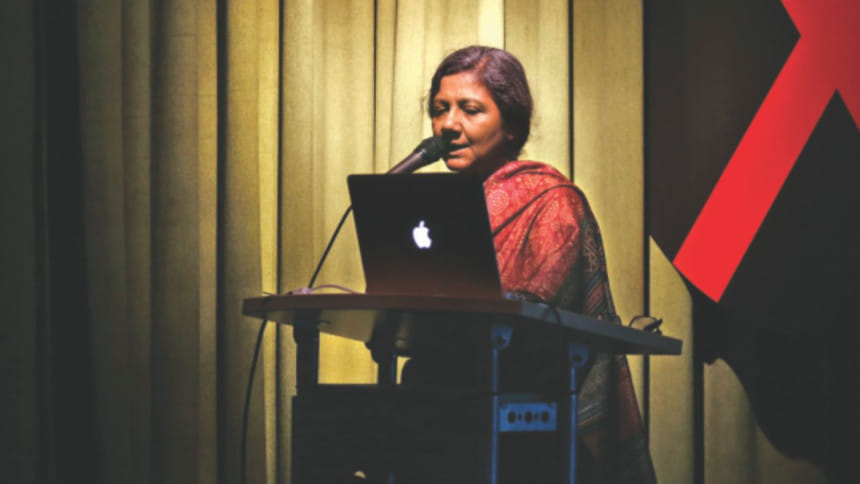MY WORK FOCUSES ON PEOPLE

During a discussion at Goethe-Institut Bangladesh on the fourth day of Chobi Mela X, singer and songwriter Moushumi Bhowmik showed how sounds and videos found their way into photography exhibitions, referring to her archives of songs and sounds.
Bhowmik has been travelling to this part of Bengal, which she refers to as an extension of her own land, for the last 25 years. She has travelled to fragmented areas of Bengal to collect various sounds, part of which was presented during her talk. The installation of the presentation was an amalgamation of the work of Bhowmik and sound recordist Sukanta Majumdar.
Since she was engaged in a process of archiving while travelling, she created a travelling archive. “A travelling archive is also about lands that seem to be constantly forming and reforming themselves,” she said. Her presentation began with an image from 1932, captured in Naogaon, Rajshahi. It was taken by Dutch music scholar, Arnold Bake, who was highly inspired by Tagore. Blake went to Santiniketan in 1925 and lived there for four years to complete his PhD. He travelled as he wrote his dissertation, and listened to different kinds of music. He wanted the world to know about the kinds of songs he came across during his travels. This was one of the reasons why he went back and convinced the Berlin-Phonogramm Archiv to give him a phonograph, so that he could document them. Arnold was also told to record the ballads of Rajput, to document the part of India which had not been europeanised. For this reason, Bhowmik believes that through archives, we sometimes create an accurate reference point for the future.
“The process of producing archives is subjective. There are no scientific methods to it,” added Bhowmik. “When we archive, there is always a purpose that is guided by our intention, politics and where we stand in life.”
She further played songs of the Fakirs and Bauls from Rajshahi. The audience also got a glimpse of the journey Bhowmik has been on to create the archive. On her travels, she spoke to people from different walks of life, including marginalised women. She also traced numerous places, which were mentioned in different documents from the past. “The archive that we are creating has its flaws. But my work focuses on people,” mentioned Bhowmik. “We are accommodating different voices in the body of the archive.”

 For all latest news, follow The Daily Star's Google News channel.
For all latest news, follow The Daily Star's Google News channel. 



Comments